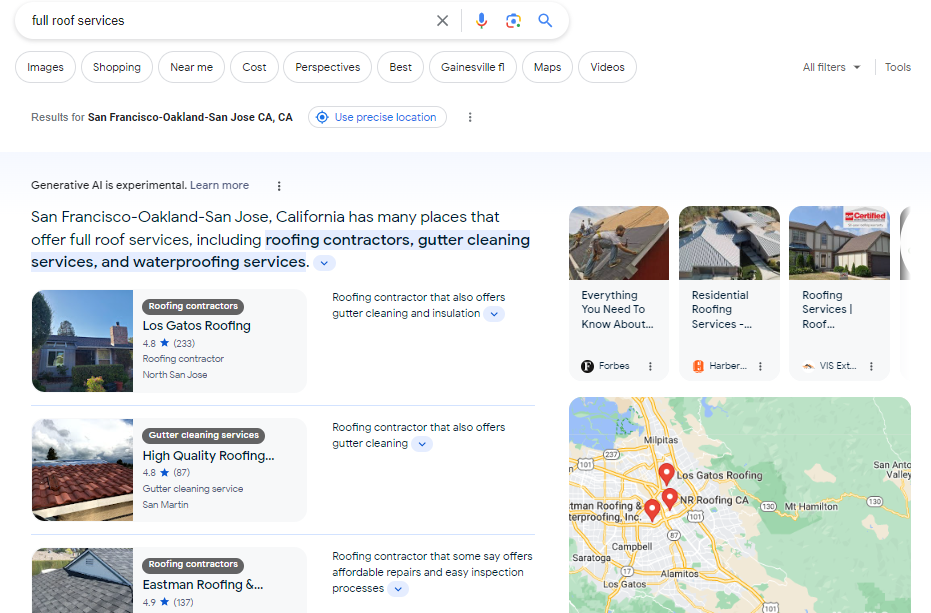Originally published on LinkedIn.
SEO, or Search Engine Optimization, is a dynamic and ever-evolving discipline within the world of marketing. And It’s quite different now compared to when it first began. The objective remains constant: making websites easily discoverable and understandable. However, the strategies employed are undergoing significant transformations, especially with the advent of Generative AI in late 2023. Here are the key SEO trends that should know for 2024 as well as explore practical steps to effectively implement them.
#1. SEARCH GENERATIVE EXPERIENCE (SGE):
SGE(Search Generative Experience) is Google’s ambitious venture into providing AI-generated responses to search queries. Expected to go public in 2024(Google announced its SGE experiment back in May 2023), it is poised to impact organic visibility by pushing traditional search results down the page. This shift makes search journeys more dynamic and less predictable.
HOW TO PREPARE FOR SGE:
-
Create content that addresses a wide array of problems your target audience might encounter.
-
Optimize product pages and categories based on user needs and preferences.
-
Structure your site to align with the demands and expectations of your audience.
-
Leverage clickable links in AI snapshots to generate clicks and maintain visibility.
#2. PEOPLE-FIRST CONTENT STRATEGIES:
Google’s “Helpful content update,” rolled out in September of the previous year, underscores the importance of content created primarily for people rather than merely for search engines. SEO is pivoting from traditional keyword optimization towards solving problems and addressing user intent.
HOW TO CREATE PEOPLE-FIRST CONTENT:
-
Understand how Google interprets queries by examining search results.
-
Focus on creating content that directly addresses specific problems or questions users have.
-
Evaluate and enhance user experience (UX) on your website to align with Google’s emphasis on helpful and user-friendly content.
-
Tailor your content strategy to user intent rather than relying solely on keywords.
#3. E-E-A-T (EXPERIENCE, EXPERTISE, AUTHORITATIVENESS, TRUSTWORTHINESS):
E-E-A-T which stands for “Experience, Expertise, Authoritativeness and Trustworthiness” emphasizes the importance of the credibility of both a website and its content creators. While not a new concept, it has gained renewed attention due to the rise of AI-generated content. Establishing your brand and authors as topical authorities becomes critical in a landscape where uniqueness and authenticity are valued.
HOW TO USE E-E-A-T:
-
Contribute content to recognized niche publications.
-
Undertake original research and studies to showcase expertise.
-
Develop a strong presence on social media platforms to build authority.
-
Create an impressive “About us” page that highlights the collective expertise of your company.
-
Seek inclusion in niche “Top experts” lists for increased visibility and co-citation benefits.
#4. SERP MARKETING AND CONTENT DIVERSIFICATION:
Google is evolving into a destination rather than just a discovery platform. “SERP marketing” involves optimizing for various search elements beyond traditional organic listings, including videos, images, and quick-answer sections.
HOW TO DOMINATE GOOGLE WITH SERP MARKETING:
-
Optimize your content for different types, including visuals and videos.
-
Implement content collaboration strategies to broaden your reach and gain natural backlinks.
-
Utilize an editorial calendar for organized and consistent content campaigns.
- Embrace omnichannel marketing to ensure compatibility across devices and create diverse marketing channels.
CONCLUSION
SEO is a fast-paced industry, and staying ahead requires adaptability. By understanding and implementing these trends in 2024, you’ll position yourself to navigate the evolving landscape successfully. Ensure your online presence remains robust and competitive, setting the stage for continued growth and visibility.





